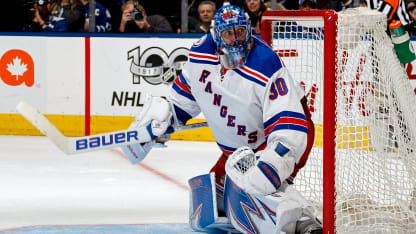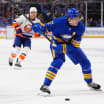Goalie wins are a difficult statistic to project, not just because of injuries and early retirements, but because they are fundamentally a team statistic. Goalies have no control over the team's scoring, which is half the equation. They also don't have complete control over goals allowed, since each team's defense will give up different numbers of shots, which are of varying quality.
So, even if Lundqvist remains healthy, active, and playing for the Rangers for the duration of his contract that runs through 2020-21, it is difficult to predict how many wins they will help him get. And beyond that, it's virtually impossible to predict how he might perform in his 40s, since fewer than 20 goalies have played past that point.
Based on a weighted average of the past four seasons, Lundqvist wins about 33 games per season, which would result in 132 more wins in the following four seasons. However, because he is 35, the natural decline goalies experience as they get older needs to be factored in.
The best method to model how a goalie's performance changes as they age is to use baseball's delta method, which calculates a player's performance as he gets older.
Based on an analysis of every goalie from the 1967-68 expansion until 2015-16, a typical goalie improves his annual win count until age 26, but at an increasingly slower rate. Then, his win totals remain relatively steady until age 29, at which point they start to decline gradually until age 32, and then by an average of at least five wins per season at ages 33 and beyond.
This model estimates a typical 35-year-old goalie who averages 33 wins will see that number drop to 25, 18, and 13 wins in the following three seasons before retiring. It drops by eight, seven, and then five wins because older goalies play fewer games, and have fewer wins left to lose. Add it up, and that means Lundqvist would win 56 more games over the next three seasons, and retire at age 38 with one season remaining on his contract. Even if he wins no more games this season, that would still place him at 460 wins, six more than Curtis Joseph, who is fourth, and 231 wins behind Brodeur.


















